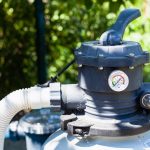Pool Inspections NJ : Identifying & Fixing Swimming Pool Leaks
When people search for providers of professional pool inspections in NJ, they are often concerned with whether or not their swimming pool is leaking. But how can you tell that your pool is actually leaking and not experiencing evaporation or another issue? You can do a few simple tests before calling a residential pool service to come to make the repairs.
Is It Really A Leak?
Companies providing pool inspections in NJ get a lot of calls from pool owners who think their pool is leaking when it really isn’t. One of the most common reasons a pool naturally loses water is through evaporation. In fact, evaporation can cause a swimming pool to lose up to two full inches of water every single week. The water will evaporate faster under certain conditions, such as increased temperature, exposure to the sun, and high humidity. If you notice substantial water loss, it may be the result of weather conditions rather than a leak.
Finding Leaks
There are a few DIY methods to see if your swimming pool has a leak. Keep in mind that these methods are not as effective as calling for professional pool inspections in NJ but they can help confirm a leak. The first DIY method is the bucket test.
The Bucket Test
This method simulates pool conditions in a bucket to help determine if evaporation or another issue is causing water loss. Fill a bucket with pool water until it is an inch or two below the rim. Place the bucket on the pool steps so the water level inside the bucket is the same as the pool water level and mark the level with black electrical tape or painter’s tape. Wait a day for the results. If the pool’s water level decreased at the same rate as the bucket, there probably is no leak in your pool. If the pool water decreased more than the bucket, a leak is likely. In this case, it’s best to call for professional pool inspections in NJ to find the exact source of the leak.
The Dye Test
The purpose of the dye test is to find the exact source of the leak. Grab dye, food coloring, or liquid reagents and get into the pool with goggles and a snorkel on. Go around your pool dripping dye into the areas you suspect a leak and observe the pool underwater to see if the dye gets sucked into any cracks. Release the dye from one end of a pool to the other and try not to disturb the water as you do so. Common leak points are skimmers, suction ports and returns, and light niches.
Professional Pool Inspections in NJ
These DIY methods are not surefire ways to detect leaks in a swimming pool. Professional pool inspection companies have better techniques with guaranteed results. They can pressurize the pipes and observe where the air pressure falls and observe where bubbles may be escaping. They can also use special cameras and microphones to detect leaks.
Fixing The Leak
While DIY methods exist for finding leaks, you should rely on a professional to fix leaks. They will be able to easily patch leaks in the liner, contain and fix leaks that occur from deteriorating pies, and fix leaks caused by the separation between the pool and plaster skimmer.
If you are searching for a swimming pool maintenance service that can ensure your pool is taken care of, look no further than Pool Operation Management. Our extensive residential and commercial maintenance services include pool opening and closing, inspections, weekly service, and so much more. If you still want to close your own pool, we have you covered. Our award-winning CPO certification courses offer all the information and training you need to properly take care of a pool. We even sell pool equipment, chemicals, and more! To get in touch with the pool experts, contact us today.







